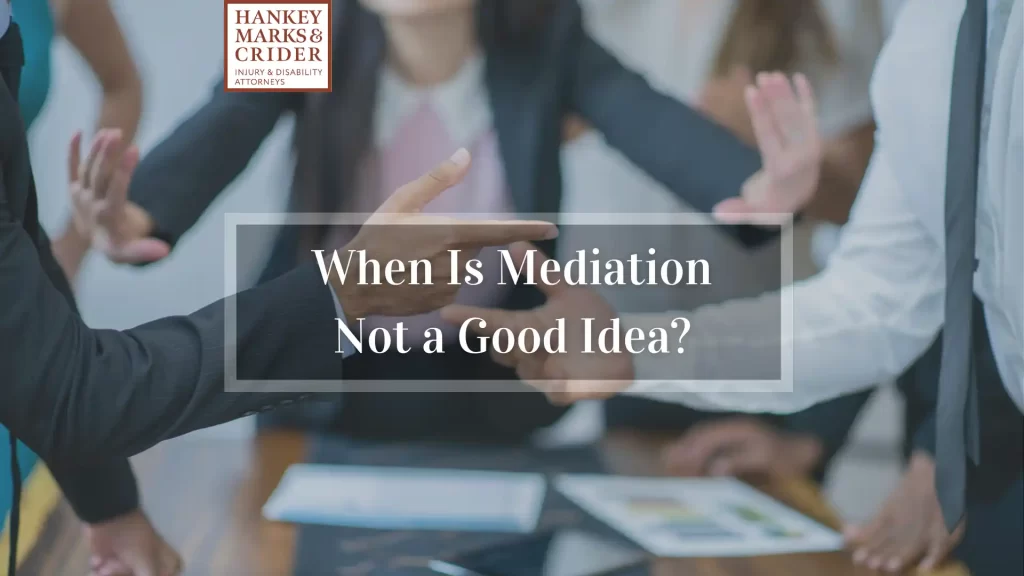
If you’ve been hurt in an accident someone else caused, you may be considering filing a lawsuit against them to demand compensation for the harm they caused you. While going to court can be a long, arduous process, you should know that many cases never proceed to the trial phase. Opposing parties can often negotiate a settlement during a process called mediation.
Mediation is a beneficial way of settling legal matters outside of court. It is less expensive and time-consuming than a lawsuit. Although it’s helpful for some, mediation isn’t always a good idea. Several factors might make mediation an undesirable or ineffective option. Before deciding, you should understand how mediation works, its benefits, and its drawbacks.
An Overview of the Mediation Process
Mediation is a common form of alternative dispute resolution (ADR). It’s a common way of resolving many legal matters, including personal injury cases. A mediator tries to help opposing parties reach an acceptable resolution to end the lawsuit. The mediator is a neutral third party, often a former judge, with no personal interest in the case and can make objective recommendations that do not unduly favor either party.
A mediator’s job isn’t to make binding decisions or pressure either side into settling. Instead, they promote amicable and productive conversations, allowing the plaintiff and defendant to set aside their differences and find a way to compromise. By focusing on the relevant issues, the mediator can offer suggestions on possible settlement agreements that work for everyone involved.
Benefits of Mediation During a Personal Injury Case
Mediation is often preferable to continued litigation. It’s an opportunity to resolve the matter in an informal setting without involving a judge or jury.
Although mediation isn’t always the appropriate next step, it offers many benefits, including:
- It takes less time than lawsuits – Mediation is a much shorter process than litigation. A lawsuit can take years to resolve, with trials lasting many days or weeks, depending on the circumstances. A single mediation session can end with a settlement in just a few hours. Sometimes, more than one session is necessary to negotiate all the terms of the agreement, but it’s significantly less time-consuming than a lawsuit.
- It’s private and confidential – Everything said during mediation remains private. At the beginning of the session, the mediator passes around a confidentiality agreement for the parties to sign. That allows each person to speak more freely without fear of someone using what they say against them later.
- It’s more cost-effective – Attending mediation requires paying only the mediator’s fee. If you proceed to trial, you’ll be responsible for court costs, filing files, attorney’s fees, and other case-related expenses. Mediation is the less expensive option.
- It provides expert intervention – Mediators know how to help opposing parties resolve their disputes and agree to a mutually acceptable settlement. They view each side objectively and can propose compromises that serve each person’s interests.
Circumstances When Mediation Isn’t Viable
 While mediation offers several benefits, it’s not the right option for everyone. You should avoid mediation under specific circumstances, including:
While mediation offers several benefits, it’s not the right option for everyone. You should avoid mediation under specific circumstances, including:
- You’re seeking punitive damages – Punitive damages punish defendants for their intentional and conscious misconduct. If you settle, you can’t pursue these damages. To seek this financial award, you must proceed to trial and present clear and convincing evidence of the defendant’s especially egregious actions.
- The insurance company acts in bad faith – Although insurance carriers are legally obligated to handle claims fairly, some intentionally delay the process, issue denials without a valid reason, or don’t properly investigate the underlying incident. You deserve compensation but want to hold the insurer liable for acting in bad faith.
- It’s still too early in the case – The opposing side might request mediation soon after the accident. Typically, they know going to trial won’t benefit them. They want to settle quickly to avoid paying you what you’re really owed. Don’t settle for the insurance company’s preferred timeline. Instead, continue treating your injury and obtain a more accurate idea of the maximum compensation you should receive.
- You have trouble choosing a mediator – You and the defendant must agree to a mediator to oversee negotiations. However, you might be unable to pick a suitable mediator you both like.
Let Hankey Marks & Crider Help with Your Lawsuit
The mediation process is beneficial for some accident victims. However, your case is unique, and what works for others might not work for you.
At Hankey Marks & Crider, our Indianapolis personal injury attorneys team has over 80 years of combined experience representing injured clients. We can review your case and determine if mediation might be right for you. If not, we won’t hesitate to pursue the compensation you deserve through other channels.
Call us today at (317) 634-8565 for your free consultation.

